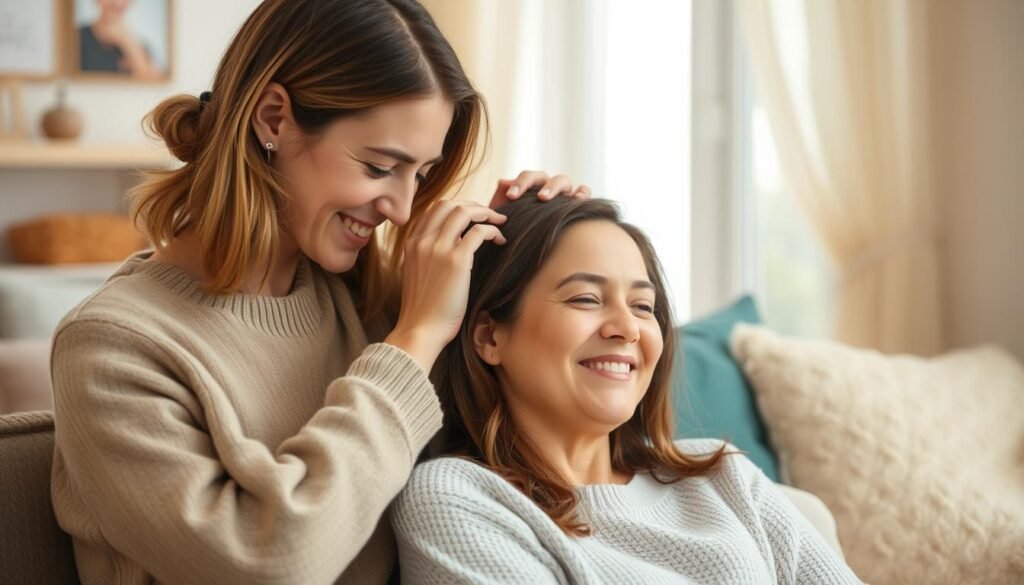Did you know about 6.8 million people in the U.S. have alopecia? This condition causes unpredictable hair loss. It affects not just the person with alopecia, but also their friends and family. Knowing how to support a loved one with alopecia is important. It helps create a caring and understanding environment during tough times.
Alopecia is more than just hair loss. It can really impact someone’s self-esteem and feelings. This article will give you tips on emotionally and practically supporting someone with hair loss. Knowledgeable friends and family are key to helping their loved ones. They offer the needed compassion and understanding.
Key Takeaways
- Understand the prevalence and impact of alopecia on individuals.
- Utilize effective alopecia support tips to foster open communication.
- Recognize the emotional weight of hair loss and its effects on self-esteem.
- Be proactive in providing both emotional and practical support.
- Stay informed about treatment options and resources available.
Understanding Alopecia: What It Is and How It Affects People
Alopecia causes people to lose their hair and affects many worldwide. It is important to know about alopecia awareness. There are different types of alopecia, like alopecia areata, androgenetic alopecia, and telogen effluvium. Each one is different and affects people in various ways.
The impact of alopecia on emotions is big. It affects the person with it and their friends and family too. Losing hair can make people feel alone and lower their self-esteem. It’s key to understand this to support and show kindness to those dealing with alopecia.
A lot of people will face hair loss during their lives. This shows how crucial it is for us all to talk openly about alopecia awareness. There are many resources available to help manage the emotional side of alopecia. They offer advice on how to feel better and enjoy life more. For detailed information on managing alopecia, check out this informative guide.
Alopecia Support Tips for Everyday Life
Supporting someone with alopecia starts with understanding. It’s vital to listen well and offer emotional support. This can make their journey easier. By communicating empathetically, your relationship can grow stronger. You allow them to share how they feel about losing hair without fear.
Listening and Providing Emotional Support
Dealing with alopecia can evoke many emotions. Creating a safe space for your loved one is crucial. They need to feel heard and validated. These steps are key:
- Encourage sharing of thoughts.
- Validate feelings without judgment.
- Be attentive and present during talks.
- Reassure them of your unwavering support.
These alopecia support tips build trust and connection. They encourage open discussions about their concerns. Regularly checking in shows you care about their well-being.
Encouraging Open Communication
Open communication reduces feelings of loneliness. It’s important to encourage your loved one to talk about their concerns. Also, to seek help when necessary. Here are some communication tips:
- Ask open-ended questions to start conversations.
- Share stories they can relate to for comfort.
- Offer to go with them to support groups for a sense of community.
- Talk about getting professional help, like therapy.
Knowing about support groups on sites like WebMD adds comfort. Urge them to connect with these communities for more support and understanding.
How to Support a Loved One with Alopecia
Supporting someone with alopecia means being empathetic, practical, and understanding. It’s tough to look after someone losing their hair. But, it helps grow closer and comfort them. Knowing what they need because of hair loss is key. Going with them to meetings can make them feel less alone.
Helping out with day-to-day tasks is also really helpful. Even simple things like errands or chores can lessen their stress. Sharing resources about dealing with alopecia can give them more control. These can be articles or videos that share others’ experiences.
It’s important to talk openly. Encourage your loved one to share how they feel and what they need. Being there, whether they just want to talk or find a support group, shows you care. Understanding their personal experience makes them feel supported.

Kind acts can brighten their day. Compliments on their strengths or fun activities can bring joy. Showing you’re there for them, through thick and thin, tells them they matter. Every person’s experience with hair loss is different. So, it’s vital to be flexible and attentive to what they need for better support.
Coping Strategies for Alopecia: Helping Them Manage Hair Loss
Supporting someone with alopecia means giving both emotional and practical help. Family and friends are crucial in building a positive self-view. They also help manage the challenges that come with losing hair.
Promoting Positive Self-Image
Encouragement boosts self-image. Simple affirmations let individuals with alopecia see their beauty and learn self-acceptance. Hosting events that boost their spirit, like spa days or outings, can change their view for the better.
Finding the Right Products and Alternatives
For hair loss, options include wigs, scarves, and hairpieces. They should try different styles to see what they like and what’s comfy. Visiting local salons or beauty stores can provide good advice on choosing the right items for their needs.

| Product Type | Benefits | Considerations |
|---|---|---|
| Wigs | Variety of styles to match personal taste | Maintenance required; potential discomfort |
| Scarves | Versatile and stylish; can be easily changed | Learning styling techniques may be needed |
| Hairpieces | Helps create a fuller look; can enhance confidence | Proper fit is essential for comfort |
| Hat | Provides warmth and style; easy to wear | May not be suitable for all occasions |
These coping strategies can really help someone with alopecia. With the right support and resources, loved ones can make the journey easier.
Emotional Support: Being There in Difficult Times
Helping someone with alopecia through emotional support can really boost their spirits. It’s all about understanding their feelings and giving them a safe space. Empathy is key in making bonds stronger when times get tough. For someone losing their hair, the roller coaster of emotions can be overwhelming. It makes a big difference when their family and friends are there for them, ready to help.
The Importance of Empathy
Empathy helps us connect deeply with others. When you truly try to understand what someone else is going through, it shows them they’re valued. They feel like they’re not facing things alone. This can make a big difference for someone with alopecia, helping cut down on feelings of being isolated or anxious. Talking about their hair loss with real concern shows you deeply care.
Creating a Supportive Environment
Making a safe place for open talks and sharing feelings is crucial. In such an environment, your loved one can talk freely without fear of being judged. It’s important to notice when they’re upset. Having an honest conversation can shine a light on what they’re feeling. Efforts to include and accept them as they are help validate whatever emotions come up.
| Strategies for Emotional Support | Impact |
|---|---|
| Active Listening | Helps the person feel heard and understood. |
| Consistent Check-Ins | Demonstrates ongoing concern and support. |
| Encouraging Expression | Allows for healthy processing of emotions. |
| Educating About Alopecia | Reduces misconceptions and promotes understanding. |

Alopecia Resources for Family and Friends
Finding support helps ease the difficulties of alopecia. Many resources exist for families who want to help. Support groups and online communities offer understanding and connection. People share experiences, strategies, and coping methods that work.
Support Groups and Online Communities
Support groups are crucial for people with alopecia and their families. They allow open conversations and insights from shared experiences. Some key organizations are:
- The National Alopecia Areata Foundation
- Local support networks
- Online platforms such as Facebook groups specific to alopecia
These groups provide emotional support and practical advice on treatments and lifestyle adjustments. Online communities are especially good because they connect families from all over. This brings different perspectives and experiences. Joining these alopecia resources for family greatly improves support for those experiencing hair loss.
Ways to Help Alopecia Patients Feel Confident
Helping someone with alopecia means boosting their self-esteem. It’s about making them feel strong and capable. Doing different activities together is key to building confidence. These activities help them bond and lift their spirits.
Participating in Activities Together
Joining in creative or self-care activities helps those with hair loss. You might want to try:
- Hair styling sessions
- Makeup classes
- Supportive group outings
- Fitness or dance classes
Doing these things can make them feel unique and improve their self-image. It is crucial when finding ways to help alopecia patients. Being active in these ways raises their confidence and allows them to express themselves.
Respecting Their Choices
It’s important to honor how people choose to deal with their looks and treatment. Supporting their choice to wear wigs, hats, or go bald gives them control. This builds trust and helps them accept themselves more.
Being supportive means understanding their journey. When we boost their confidence and support them no matter what, we empower them. For more tips on ways to help alopecia patients, check out these resources. They can improve your support experience.
Alopecia Treatment Options: Offering Practical Help
Helping someone with alopecia means looking into treatment options. It’s key to know about things like creams, injections, and life changes. This helps family and friends talk about what treatments to try. Looking into these treatments can give both support and clear info.
Researching Treatment Plans
Researching alopecia treatments is helpful. It brings a sense of working together. Loved ones can find out how well treatments work and their side effects. This leads to good talks about the best choices for them. This support means making decisions together.
Accompanying Them to Appointments
Going to doctor visits with someone can lighten their stress. It shows they’re not alone and offers real help. It’s a chance to write down notes, ask things, and understand treatment plans. With support, the treatment path feels less daunting. For more help, visit Ageless Glimmer.